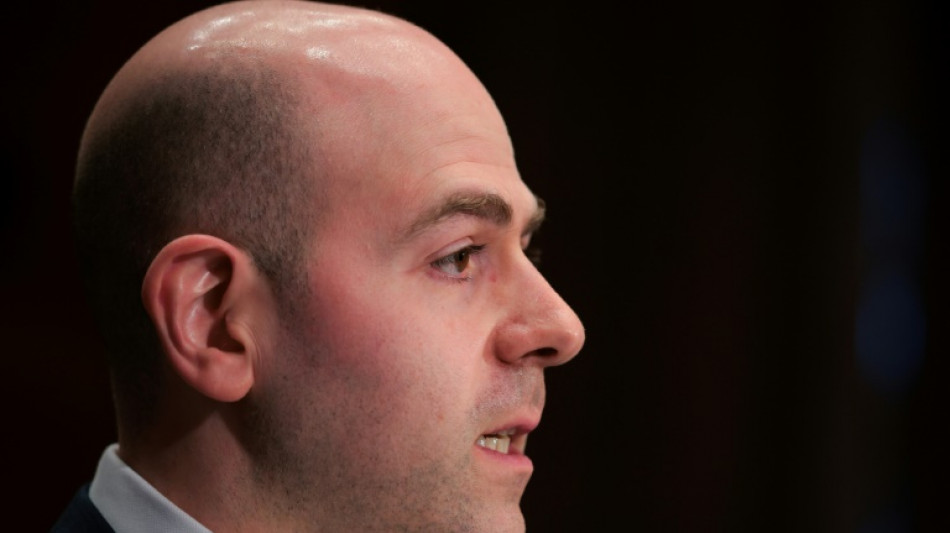
-
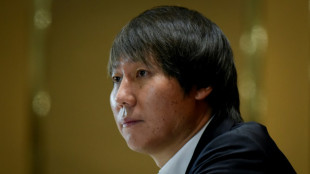 Ex-Premier League star Li Tie loses appeal in 20-year bribery sentence
Ex-Premier League star Li Tie loses appeal in 20-year bribery sentence
-
Belgium's green light for red light workers

-
 Haliburton leads comeback as Pacers advance, Celtics clinch
Haliburton leads comeback as Pacers advance, Celtics clinch
-
Rahm out to break 2025 win drought ahead of US PGA Championship

-
 Japan tariff envoy departs for round two of US talks
Japan tariff envoy departs for round two of US talks
-
Djurgarden eyeing Chelsea upset in historic Conference League semi-final

-
 Haliburton leads comeback as Pacers advance, Pistons stay alive
Haliburton leads comeback as Pacers advance, Pistons stay alive
-
Bunker-cafe on Korean border paints image of peace

-
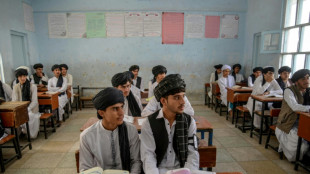 Tunics & turbans: Afghan students don Taliban-imposed uniforms
Tunics & turbans: Afghan students don Taliban-imposed uniforms
-
Asian markets struggle as trade war hits China factory activity

-
 Norwegian success story: Bodo/Glimt's historic run to a European semi-final
Norwegian success story: Bodo/Glimt's historic run to a European semi-final
-
Spurs attempt to grasp Europa League lifeline to save dismal season

-
 Thawing permafrost dots Siberia with rash of mounds
Thawing permafrost dots Siberia with rash of mounds
-
S. Korea prosecutors raid ex-president's house over shaman probe: Yonhap
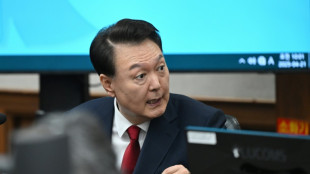
-
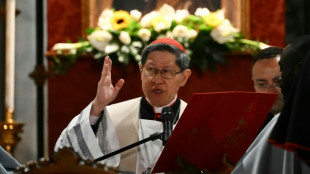 Filipino cardinal, the 'Asian Francis', is papal contender
Filipino cardinal, the 'Asian Francis', is papal contender
-
Samsung Electronics posts 22% jump in Q1 net profit
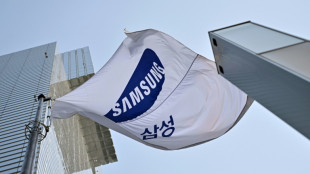
-
 Pietro Parolin, career diplomat leading race to be pope
Pietro Parolin, career diplomat leading race to be pope
-
Nuclear submarine deal lurks below surface of Australian election
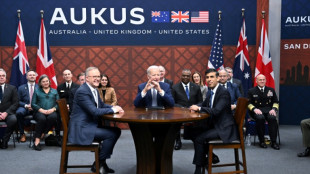
-
 China's manufacturing shrinks in April as trade war bites
China's manufacturing shrinks in April as trade war bites
-
Financial markets may be the last guardrail on Trump
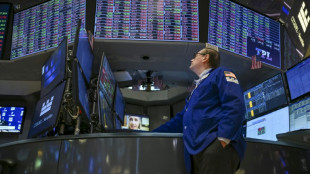
-
 Swedish journalist's trial opens in Turkey
Swedish journalist's trial opens in Turkey
-
Kiss says 'honour of a lifetime' to coach Wallabies at home World Cup

-
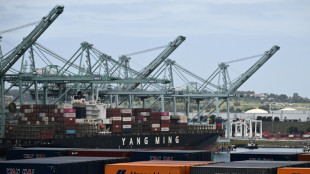 US growth figure expected to make for tough reading for Trump
US growth figure expected to make for tough reading for Trump
-
Opposition leader confirmed winner of Trinidad elections
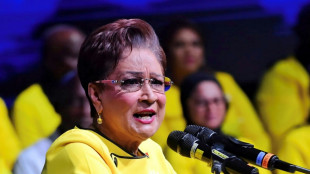
-
 Snedeker, Ogilvy to skipper Presidents Cup teams: PGA Tour
Snedeker, Ogilvy to skipper Presidents Cup teams: PGA Tour
-
Win or bust in Europa League for Amorim's Man Utd

-
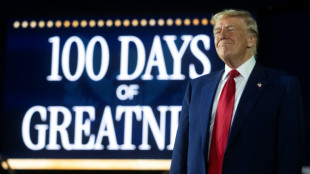 Trump celebrates 100 days in office with campaign-style rally
Trump celebrates 100 days in office with campaign-style rally
-
Top Cuban dissidents detained after court revokes parole

-
 Arteta urges Arsenal to deliver 'special' fightback against PSG
Arteta urges Arsenal to deliver 'special' fightback against PSG
-
Trump fires Kamala Harris's husband from Holocaust board

-
 Pakistan says India planning strike as tensions soar over Kashmir attack
Pakistan says India planning strike as tensions soar over Kashmir attack
-
Weinstein sex attack accuser tells court he 'humiliated' her
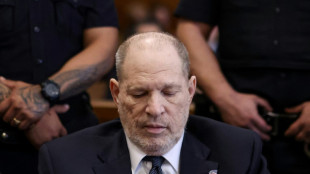
-
 France accuses Russian military intelligence over cyberattacks
France accuses Russian military intelligence over cyberattacks
-
Global stocks mostly rise as Trump grants auto tariff relief

-
 Grand Vietnam parade 50 years after the fall of Saigon
Grand Vietnam parade 50 years after the fall of Saigon
-
Trump fires ex first gentleman Emhoff from Holocaust board

-
 PSG 'not getting carried away' despite holding edge against Arsenal
PSG 'not getting carried away' despite holding edge against Arsenal
-
Cuban dissidents detained after court revokes parole

-
 Sweden stunned by new deadly gun attack
Sweden stunned by new deadly gun attack
-
BRICS blast 'resurgence of protectionism' in Trump era
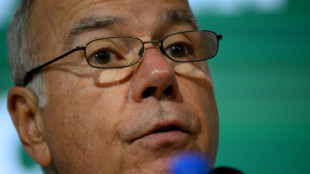
-
 Trump tempers auto tariffs, winning cautious praise from industry
Trump tempers auto tariffs, winning cautious praise from industry
-
'Cruel measure': Dominican crackdown on Haitian hospitals

-
 'It's only half-time': Defiant Raya says Arsenal can overturn PSG deficit
'It's only half-time': Defiant Raya says Arsenal can overturn PSG deficit
-
Dembele sinks Arsenal as PSG seize edge in Champions League semi-final

-
 Les Kiss to take over Wallabies coach role from mid-2026
Les Kiss to take over Wallabies coach role from mid-2026
-
Real Madrid's Rudiger, Mendy and Alaba out injured until end of season

-
 US threatens to quit Russia-Ukraine effort unless 'concrete proposals'
US threatens to quit Russia-Ukraine effort unless 'concrete proposals'
-
Meta releases standalone AI app, competing with ChatGPT

-
 Zverev crashes as Swiatek scrapes into Madrid Open quarter-finals
Zverev crashes as Swiatek scrapes into Madrid Open quarter-finals
-
BRICS members blast rise of 'trade protectionism'
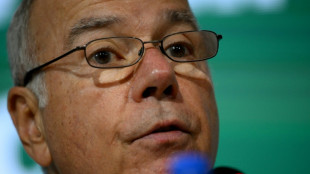

The Trump adviser who wants to rewrite the global financial system
One of the architects of US President Donald Trump's tariff blitz has advocated a shake-up of the global trade and financial systems, centred on a radical strategy to weaken the dollar.
Stephen Miran, chairman of the White House Council of Economic Advisers, outlined his idea in a 41-page essay titled "A User's Guide to Restructuring the Global Trading System".
Little known until now, the Harvard-trained economist's paper -- published in November after Trump's election win -- has garnered attention in recent weeks due to its emphasis on tariffs and a weak dollar.
Some analysts say the essay provides the intellectual rationale for Trump's trade war.
- 'Mar-a-Lago Accord' -
For Miran, tariffs and moving away from a strong dollar could have "the broadest ramifications of any policies in decades, fundamentally reshaping the global trade and financial systems".
Miran's essay argues that a strong dollar makes US exports less competitive and imports cheaper, while handicapping American manufacturers as it discourages investing in building factories in the United States.
"The deep unhappiness with the prevailing economic order is rooted in persistent overvaluation of the dollar and asymmetric trade conditions," Miran wrote.
The dollar is traditionally a safe haven currency for investors in the event of war or crisis, and it has slumped in recent days over concerns about Trump's trade policies.
It is used by used by foreign companies and governments to buy oil, aircraft and other goods at dollar-denominated prices.
The strong dollar tends to make US government bonds attractive to foreign investors, giving the United States an almost unlimited capacity to borrow.
Miran called for a pact similar to that of the 1985 Plaza Accord, signed in New York by the United States, Britain, France, West Germany and Japan.
The landmark agreement, named after the New York hotel where it was inked, allowed for a controlled weakening of the then-overvalued dollar to reduce the US trade deficit.
Miran said the new agreement could be called the "Mar-a-Lago Accord", after Trump's Florida resort.
"President Trump views tariffs as generating negotiating leverage for making deals," Miran wrote.
"It is easier to imagine that after a series of punitive tariffs, trading partners like Europe and China become more receptive to some manner of currency accord in exchange for a reduction of tariffs."
- Replenish government coffers -
To lower the value of the US currency, Miran said US partners could sell dollars in their possession.
Another proposal would be to swap the Treasury bonds held by creditors -- usually borrowed over a few years -- for 100-year debt.
As a result, the US would not have to repay them regularly, and would limit the potential rise in interest rates caused by fears over such a financial upheaval on the markets, Miran said.
He also suggested imposing a "user fee" on foreign official holders of Treasury securities, as a way to replenish government coffers.
Countries that cooperate could see their tariffs lowered and could continue to rely on the US military umbrella, he said.
- 'De facto default' -
Vicky Redwood, senior economic adviser at UK-based Capital Economics, said forcing US lenders to swap bonds would amount to a "de facto default on US debt".
Charging a user fee on Treasury repayments abroad seemed "highly unrealistic", experts at Swiss bank Pictet said in a note, and "could be interpreted as breach of contract, or akin to a default".
For Eric Monnet, professor at the Paris School of Economics, it all depends on the content of the contract.
"If the US manages to get (other) countries to agree, legally it can be done without default," he said at a recent conference.
- A risky plan -
Economists have largely been very critical of Miran's ideas.
"If the US really does want to reduce its trade deficit, there are better ways to do it," Redwood said.
She also pointed to the risk of soaring US borrowing rates, which have taken off in recent days, a sign of growing concern about US economic policy.
The potential "Mar-a-Lago Accord is misguided from both a theoretical and practical perspective", Pictet experts wrote in their note, questioning Miran's thinking on the origins of the dollar's overvaluation.
Adam Slater, an economist at British firm Oxford Economics, told AFP that in order to significantly narrow the trade deficit, the dollar would likely have to depreciate by more than 20 percent.
C.Stoecklin--VB

